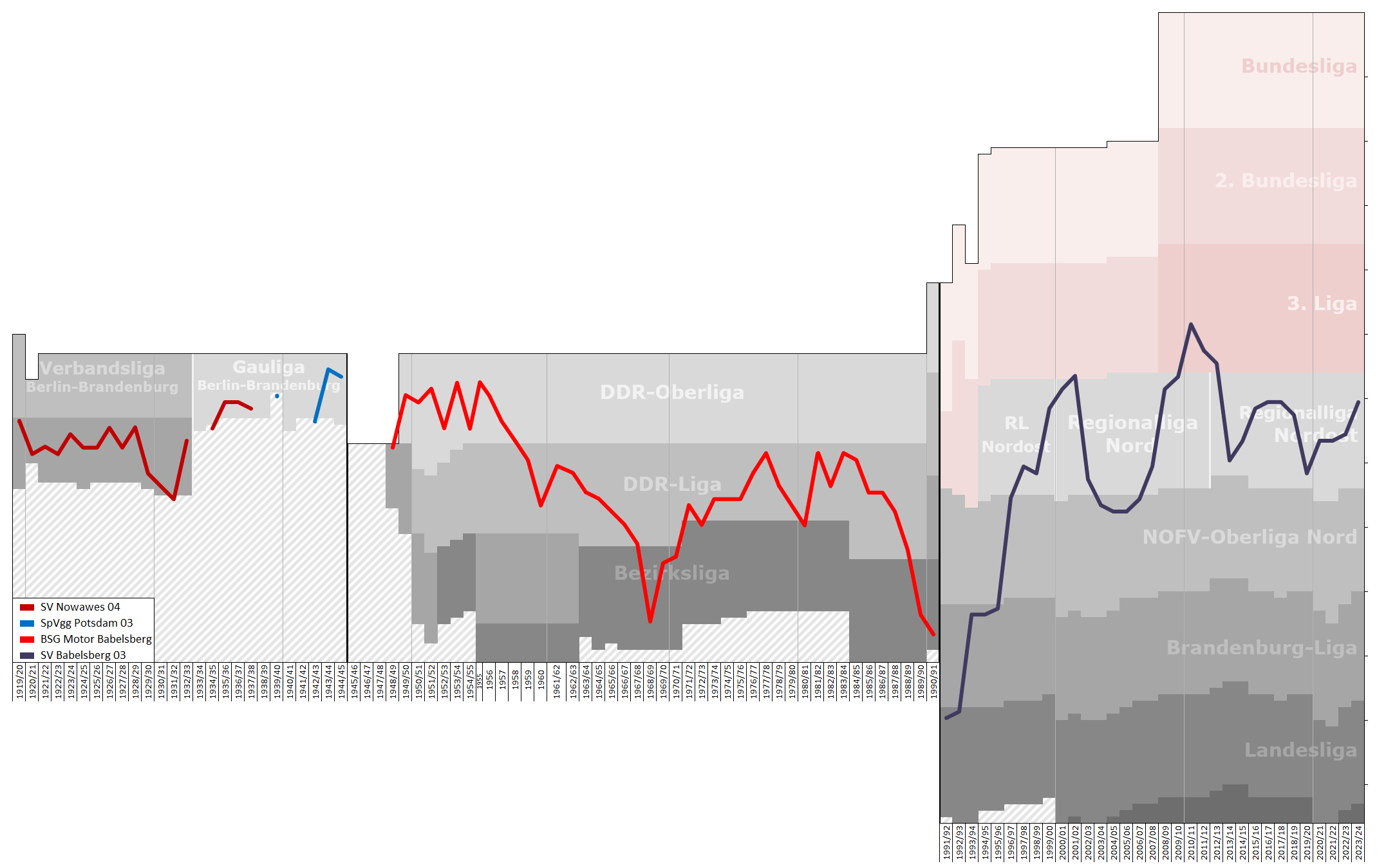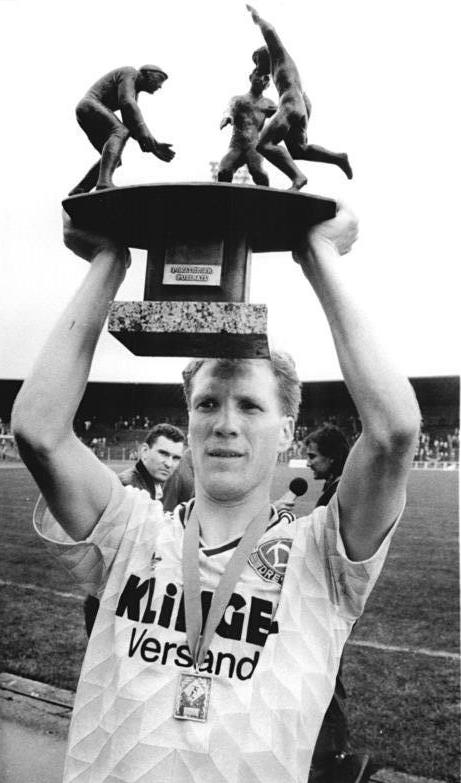|
Fortuna Babelsberg
Fortuna Babelsberg is a German football club from the south-eastern part of the city (''Am Stern'') of Potsdam in Brandenburg. A former top-flight East German side, they currently play in the Landesklasse Brandenburg-West, the eighth tier of the German football league system. History The history of the club begins with the 1906 establishment of ''Concordia Babelsberg''. The club was lost in 1933 when left-leaning worker's sports clubs were disbanded under the Third Reich. A side more politically palatable to the regime was formed in 1934 as ''VfL Eintracht 06 Babelsberg''. This club was also in its turn lost in the aftermath of World War II when organizations across Germany, including sports and football associations, were dissolved by occupying Allied authorities. Play in East German competition After the war a separate football competition emerged in the Soviet-occupied eastern half of the country. ''Sportgruppe Babelsberg'' was formed in 1946 out of the former membershi ... [...More Info...] [...Related Items...] OR: [Wikipedia] [Google] [Baidu] |
Sportanlage Am Stern
The Sportanlage Am Stern is a football stadium in the south-east of Potsdam, Germany. Fortuna Babelsberg Fortuna Babelsberg is a German football club from the south-eastern part of the city (''Am Stern'') of Potsdam in Brandenburg. A former top-flight East German side, they currently play in the Landesklasse Brandenburg-West, the eighth tier of th ... play their home games here. External links Pictures of the stadium at potsdam-abc.de Football venues in Germany Sport in Potsdam Sports venues in Brandenburg {{Brandenburg-struct-stub ... [...More Info...] [...Related Items...] OR: [Wikipedia] [Google] [Baidu] |
DDR-Liga
The DDR-Liga (English: GDR League or ''East German League'') was, prior to German reunification in 1990, the second level of football competition in the DDR (Deutsche Demokratische Republik or German Democratic Republic, commonly East Germany), being roughly equivalent to the 2. Bundesliga in West Germany. Overview 1950-1955 The league was established with two divisions of ten teams each in 1950 as the level of play below the DDR-Oberliga, and as such was the second tier of the East German football league system. It remained the second tier in various configurations throughout its existence until it was disbanded in 1991. The champion of each division was directly promoted to the Oberliga. While not having geographical "tags" attached to the division, ''Staffel 1'' was originally equivalent to a ''Northern Division'' while ''Staffel 2'' was the ''Southern Division''. The system was not static however, clubs were often moved between groups to balance out league numbers, and someti ... [...More Info...] [...Related Items...] OR: [Wikipedia] [Google] [Baidu] |
Sport In Potsdam
Sport pertains to any form of competitive physical activity or game that aims to use, maintain, or improve physical ability and skills while providing enjoyment to participants and, in some cases, entertainment to spectators. Sports can, through casual or organized participation, improve participants' physical health. Hundreds of sports exist, from those between single contestants, through to those with hundreds of simultaneous participants, either in teams or competing as individuals. In certain sports such as racing, many contestants may compete, simultaneously or consecutively, with one winner; in others, the contest (a ''match'') is between two sides, each attempting to exceed the other. Some sports allow a "tie" or "draw", in which there is no single winner; others provide tie-breaking methods to ensure one winner and one loser. A number of contests may be arranged in a tournament producing a champion. Many sports leagues make an annual champion by arranging gam ... [...More Info...] [...Related Items...] OR: [Wikipedia] [Google] [Baidu] |
Association Football Clubs Established In 1905
Association may refer to: *Club (organization), an association of two or more people united by a common interest or goal *Trade association, an organization founded and funded by businesses that operate in a specific industry *Voluntary association, a body formed by individuals to accomplish a purpose, usually as volunteers Association in various fields of study * Association (archaeology), the close relationship between objects or contexts. * Association (astronomy), combined or co-added group of astronomical exposures *Association (chemistry) * Association (ecology), a type of ecological community *Genetic association, when one or more genotypes within a population co-occur * Association (object-oriented programming), defines a relationship between classes of objects *Association (psychology), a connection between two or more concepts in the mind or imagination * Association (statistics), a statistical relationship between two variables *File association, associates a file with ... [...More Info...] [...Related Items...] OR: [Wikipedia] [Google] [Baidu] |
Football Clubs In Brandenburg
Football is a family of team sports that involve, to varying degrees, Kick (football), kicking a Football (ball), ball to score a Goal (sport), goal. Unqualified, Football (word), the word ''football'' normally means the form of football that is the most popular where the word is used. Sports commonly called ''football'' include association football (known as ''soccer'' in North America and Australia); gridiron football (specifically American football or Canadian football); Australian rules football; rugby union and rugby league; and Gaelic football. These various forms of football share to varying extent common origins and are known as "football codes". There are a number of references to traditional, ancient, or prehistoric ball games played in many different parts of the world. Contemporary codes of football can be traced back to English public school football games, the codification of these games at English public schools during the 19th century. The expansion and cultur ... [...More Info...] [...Related Items...] OR: [Wikipedia] [Google] [Baidu] |
Football Clubs In East Germany
Football is a family of team sports that involve, to varying degrees, kicking a ball to score a goal. Unqualified, the word ''football'' normally means the form of football that is the most popular where the word is used. Sports commonly called ''football'' include association football (known as ''soccer'' in North America and Australia); gridiron football (specifically American football or Canadian football); Australian rules football; rugby union and rugby league; and Gaelic football. These various forms of football share to varying extent common origins and are known as "football codes". There are a number of references to traditional, ancient, or prehistoric ball games played in many different parts of the world. Contemporary codes of football can be traced back to the codification of these games at English public schools during the 19th century. The expansion and cultural influence of the British Empire allowed these rules of football to spread to areas of British i ... [...More Info...] [...Related Items...] OR: [Wikipedia] [Google] [Baidu] |
Karl-Liebknecht-Stadion
The Karl-Liebknecht-Stadion is a football stadium in Potsdam-Babelsberg, Germany. It is the home stadium of 1. FFC Turbine Potsdam and SV Babelsberg 03. The stadium has a capacity of 10,787 for 8,784 standing and 2,003 seated guests. Named in honor of Karl Liebknecht, the Communist Party of Germany leader who was assassinated by a Freikorps in January 1919. History The stadium was opened on 10 July 1976 with a football match between BSG Motor Babelsberg and the Olympic team of the German Democratic Republic where Team GDR won, 5–0. The original capacity of 15,000 was reached only once as the East Germany national football team faced Malta. On 9 July 2001, the SV Babelsberg 03 had its highest attendance in their club history when 14,700 spectators witnessed Babelsberg's win over Fortuna Düsseldorf. The last renovation was held in 2002, and the stadium now has its current capacity. About one year later, the Women's Bundesliga match between 1. FFC Turbine Potsdam and 1. FFC ... [...More Info...] [...Related Items...] OR: [Wikipedia] [Google] [Baidu] |
Verbandsliga Brandenburg
The Brandenburg-Liga (VI) (''formerly the Verbandsliga Brandenburg'') is the highest league for football teams exclusively in the German state of Brandenburg and at step six of the German football league system. Until the introduction of the 3. Liga in 2008 it was the fifth tier of the league system, until the introduction of the Regionalligas in 1994 the fourth tier. The champions of the Brandenburg-Liga are directly promoted to the NOFV-Oberliga Nord. If the champion is from the southern part of the state, it enters the Oberliga Süd. Overview The Brandenburg-Liga, previously referred to as the ''Verbandsliga Brandenburg'', was established in 1990 from thirteen clubs as a highest league for the German state of Brandenburg, which was established after the league in October 1990, and the Brandenburg Football Association, FLB (German: ''Fußball-Landesverband Brandenburg''). It comprised the area of the three Bezirksligas of Potsdam, Frankfurt (Oder) and Cottbus. Each of those ... [...More Info...] [...Related Items...] OR: [Wikipedia] [Google] [Baidu] |
German Reunification
German reunification (german: link=no, Deutsche Wiedervereinigung) was the process of re-establishing Germany as a united and fully sovereign state, which took place between 2 May 1989 and 15 March 1991. The day of 3 October 1990 when the German Reunification Treaty entered into force dissolving the German Democratic Republic (GDR; german: link=no, Deutsche Demokratische Republik, DDR, or East Germany) and integrating its recently re-established constituent federated states into the Federal Republic of Germany (FRG; german: link=no, Bundesrepublik Deutschland, BRD, or West Germany) to form present-day Germany, has been chosen as the customary '' German Unity Day'' () and has thereafter been celebrated each year from 1991 as a national holiday. East and West Berlin were united into a single city and eventually became the capital of reunited Germany. The East Germany's government led by the Socialist Unity Party of Germany (SED) (a communist party) started to falter on 2 ... [...More Info...] [...Related Items...] OR: [Wikipedia] [Google] [Baidu] |
SV Babelsberg
SV Babelsberg 03 is a German association football club based in Potsdam- Babelsberg, on the outskirts of Berlin. The team was founded as ''Sport-Club Jugendkraft 1903'' and again as ''SG Karl-Marx Babelsberg'' in 1948 as successor to the pre-war side SpVgg Potsdam 03. History Playing as ''SV Nowawes'' the team gained promotion in 1935 to the first tier Gauliga Berlin-Brandenburg, one of sixteen top flight divisions formed in the re-organization of German football under the Third Reich. The club was relegated after just three seasons at that level never finishing better than eighth in their ten team division. The club returned to the Gauliga as ''SpVgg Potsdam'' in 1943 and earned third- and fourth-place finishes in the two years before the end of World War II. Postwar play in East Germany Following the war, occupying Allied authorities ordered the dissolution of all organizations in the country, including sports and football associations. The former membership of ''SpVgg'' ... [...More Info...] [...Related Items...] OR: [Wikipedia] [Google] [Baidu] |
FDGB Pokal
The FDGB-Pokal (Freier Deutscher Gewerkschaftsbund Pokal or Free German Trade Union Federation Cup) was an elimination football tournament held annually in East Germany. It was the second most important national title in East German football after the DDR-Oberliga championship. The founder of the competition was East Germany's major trade union. History The inaugural FDGB-Pokal (generally referred to in English as the East German Cup) was contested in 1949, four years before the initial DFB-Pokal was played in the western half of the country. The first national cup competition had been the Tschammerpokal introduced in 1935. Each football club which participated in the East German football league system was entitled to enter the tournament. Clubs from the lower leagues played in regional qualification rounds, with the winners joining the teams of the DDR-Oberliga and DDR-Liga in the main round of the tournament of the following year. Each elimination was determined by a singl ... [...More Info...] [...Related Items...] OR: [Wikipedia] [Google] [Baidu] |




